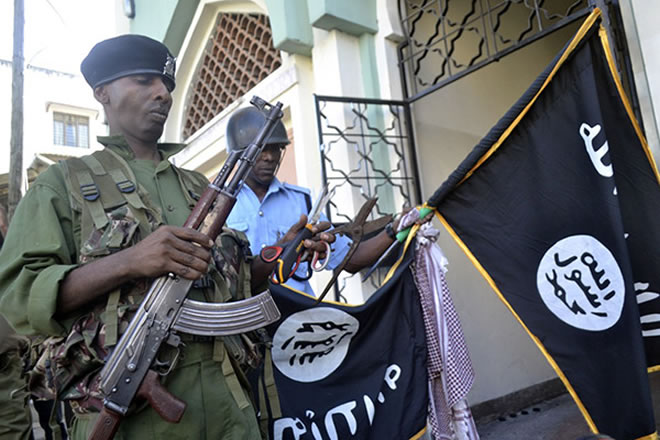
Police officers display an AK 47 riffle recovered after police stormed the Masjid Mussa mosque in Mombasa on February 2, 2014. County Commissioner Nelson Marwa said the longstanding differences between the Council of Imams and Preachers of Kenya (CIPK) and the Supreme Council of Kenya Muslims (Supkem) had caused a leadership vacuum in the Muslim community at the Coast, exposing the youth to influence by radicals. PHOTO KEVIN ODIT. NATION

By Wachira Mwangi, Nehemiah Okwembah, and Daniel Nyassy
Sunday, February 09, 2014
County Commissioner Nelson Marwa said the longstanding differences between the Council of Imams and Preachers of Kenya (CIPK) and the Supreme Council of Kenya Muslims (Supkem) had caused a leadership vacuum in the Muslim community at the Coast, exposing the youth to influence by radicals.
“The youths are exploiting the differences between Council of Imams and Supkem.
It is now time for leaders from all religious organisations to come together and solve the problem of radicalisation. Great leaders are known in times of crisis,” said Mr Marwa.
More than 100 youths were arrested in Masjid Musa mosque in Mombasa last Sunday after police disrupted a “Jihad convention”.
At least three people were killed during the confrontation between the youth and police.
The mosque has been the venue of several confrontations and the government is warning that it might be forced to close it down as it was being used to teach radical ideologies to young Muslims.
During a conference organised by the Kenya Muslim National Advisory Council (Kemnac) on Radicalisation, De-radicalisation, Extremism and Violence at Panaroma Hotel Saturday, Sheikh Juma Ngao said that they came together to discuss a lasting solution to end radicalisation and also to enlighten the Muslim community on the real meaning of Jihad.
“This issue of radicalisation has been a thorn and most of our youths are being misled and taught the wrong definitions of Jihad.
We are also here to end blame games between the government and the Muslim community especially where security is concerned,” Sheikh Ngao said.
The meeting was attended by Muslim clerics from more than 100 mosques in Mombasa County and was also attended by Nyali MP Hezron Awiti Bolo.
During a meeting with the Somali community yesterday morning, Leader of the Majority in Parliament Aden Duale condemned radicalisation of Muslim youths and urged the government to take stern action against those behind the vice.
Mr Duale noted that as the Somali community, they will not allow Islam to be used to radicalise youth.
“We shall hold a very big forum in Nairobi in the next two weeks to bring together Muslim leaders, Muslim clerics, scholars, representatives from the Somali community and Muslim stakeholders to discuss radicalisation,” said Mr Duale.
The MP told Muslim faithful that mosques are a sacred place of prayer and must not be used to promote radicalisation.
He urged the government not to release those behind the Masjid Musa Al-Shabaab flags, laptops, disks, weapons and the Jihadist programme.
At the meeting with the clerics, Mr Marwa said the government was ready to work with all communities and religions but will not tolerate criminal acts and hooliganism.
The leaders condemned the radicalisation among the coastal youths and asked imams to stop exalting jihadist teachings that were being conducted at Masjid Musa last Sunday.
Sheikh Ngao said that most of the youth have not gone through the right teaching.
Muslim clerics would find a way to reach all the youth in the county and urged the government to support the initiative.
Mr Awiti said that Mombasa County was losing a lot in terms of business due to negative publicity. He said the county government must redeem the town’s image to attract investors.
“We cannot get investors and tourists in this city if we do not maintain peace. Let us, as leaders, come together and find a way forward to resolve this crisis. We need to find a solution as leaders,” he said.
Mr Awiti blamed the government for laxity in dealing with radicalisation in good time, saying, “The government dealt with Mungiki, SLDF, Chinkororo, and MRC, who are these radicals in Mombasa?”
Religious leaders and security officials laso met in Malindi Saturday to discuss ways in which violence being witnessed in Mombasa does not spill over to the northern coastal town.
Malindi Sub County Assistant Deputy County Commissioner Yusuf Mohamed who hosted the six-hour meeting in his office said that security was paramount and that security officers were on high alert and ready to deal with any Muslim uprising in the area.
In trying to protect religion, Sheikh Badawi and Famau Famau said that the youths involved in criminal activities did not attend any mosque preaching and were just idlers taking advantage of a small situation to disrupt peace.
“These are boys who spend their time in dens smoking bahng and other drugs, they only surface when there is violence because that’s what they love,” added Badawi.
Senior Superintendent of the Administration Police in Malindi Nelson Masengeli cautioned parents against defending their children whenever they were caught in criminal acts adding that they too risked arrest for keeping criminals.
“These boys have no money and there are influential people behind any youth activities.
I take this podium to caution them that their days are number and to you religious leaders if you know one in your area just report to us and action shall be taken,” said Masengeli.